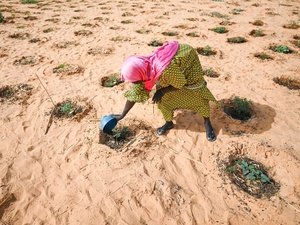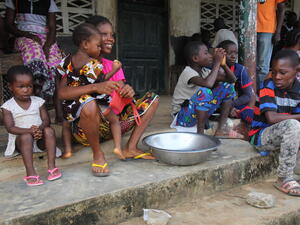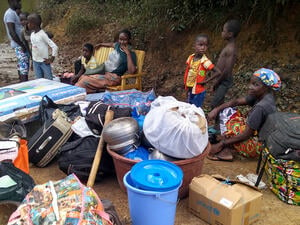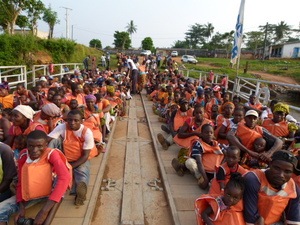UNHCR office destroyed in Guinea fighting
UNHCR office destroyed in Guinea fighting
UNHCR warned Thursday of a looming humanitarian catastrophe in the West African state of Guinea and reported its office in the south-western town of Guéckédou was destroyed during fighting between government troops and rebels. UNHCR officials Thursday were trying to determine the status of the agency's local staff members in the town, which came under rebel attack on Wednesday morning.
Radio contact with UNHCR Guéckédou was cut early Wednesday, according to UNHCR's main office in the Guinea capital of Conakry. The last messages received early Wednesday from the UNHCR radio operator indicated heavy gunfire in the town of 31,000 people. There were no international UNHCR workers in Guéckédou. Initial reports received Thursday indicated the UNHCR office was burned during the fighting and eight vehicles were destroyed. Unconfirmed reports say that hundreds of civilians were killed in the town.
Cross-border attacks - reportedly from Liberia and Sierra Leone - began intensifying last August. UNHCR suspended its activities in mid-September following the murder of a staff member in the town of Macenta by unidentified attackers. The refugee agency began resuming some of its operations in early October. A one-month lull in attacks ended in late November, however, prompting UNHCR to again suspend food distribution to refugees in Guéckédou and to recall international staff to Conakry.
Guinea is host to Africa's second-largest refugee population, including 130,000 Liberians and 330,000 Sierra Leoneans. Until recently, Guinea's relative stability offered some protection for refugees fleeing neighbouring Liberia and Sierra Leone, both plagued by years of strife. But the conflict has now spread across the border and the growing insecurity has also generated increasing animosity among Guineans towards the huge refugee population.
"UNHCR and the government of Guinea have been warning for months that the international community must take urgent action to secure this volatile border region," said High Commissioner Sadako Ogata. "We are now on the verge of a major humanitarian catastrophe in which both refugees and tens of thousands of local residents may be displaced within Guinea itself. Local residents are also being killed.
"As I told the Security Council in New York on November 10, the international community must take concrete measures now, including support for the local law enforcement capacity in insecure border areas - especially in and around refugee sites. As a humanitarian organization, UNHCR can only do its job if the security conditions are in place. Right now, they are not."
UN security reports indicate that thousands of Guinean civilians have fled Guéckédou over the past two days, heading northwards toward the town of Kissidougou. UNHCR fears that refugees are also joining the exodus from the Guéckédou area, where a string of border camps house some 200,000 Liberians and Sierra Leoneans.
UNHCR and its partners had been working to relocate border camps in the Guéckédou area further inland. With the renewed attacks, the necessity for relocation is all the more urgent. The Guinea government has approved UNHCR's proposal to move 30,000 refugees from Macenta to Nzérékoré. A further 80,000 refugees in border areas in Guéckédou will be relocated to new camp sites in Kissidougou, while those in Nzérékoré will remain in the prefecture, further inland in former camp sites that need rehabilitation. Under the plan, Sierra Leone refugees will be given a choice between relocating within Guinea or returning with UNHCR assistance to stable areas in Sierra Leone.
UNHCR's office in Conakry has set up an Emergency Relocation Operation Task force to begin preparing for the movement, which now appears increasingly risky in view of the renewed fighting.
In the Nzérékoré region of south-eastern Guinea, meanwhile, the governor has informed UNHCR of plans to evacuate the entire civilian population from Thuo, across the border from the Liberia's Nimba County. The region has reportedly been the scene of recent cross-border conflict. UNHCR has agreed to a request by the Nzérékoré governor to relocate refugees from Thuo to the Bossou camp, which was initially set up as a transit camp for repatriation to Liberia.
UNHCR had been repatriating Liberian refugees until the end of the dry season in mid-July. Some 130,000 Liberians remain in Guinea. An increasing number of Sierra Leoneans have spontaneously returned home since September following the deteriorating security situation in Conakry and areas where camps are situated. Inside Sierra Leone, UNHCR is assisting more than 15,000 returnees who cannot go back to their original homes because they are in areas controlled by rebels of the Revolutionary United Front, which is fighting government forces.









